Features
HOTEL SCHOOL NOSTALGIA LIVES ON… – Part 21
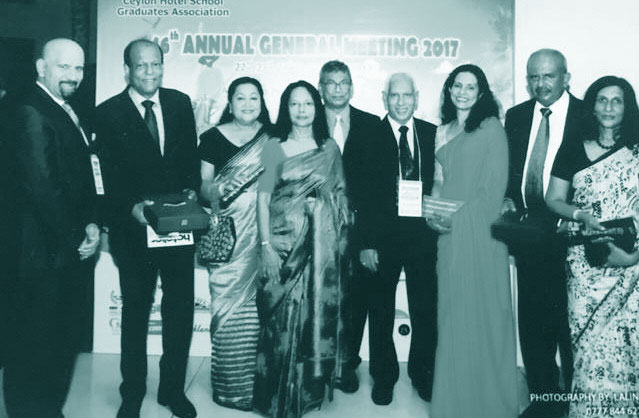
CONFESSIONS OF A GLOBAL GYPSY
By Dr. Chandana (Chandi) Jayawardena DPhil
President – Chandi J. Associates Inc. Consulting, Canada
Founder & Administrator – Global Hospitality Forum
chandij@sympatico.ca
The 50th Anniversary of CHSGA
On October 16, 2021 I attended another annual general meeting (AGM) of the Ceylon Hotel School Graduates Association (CHSGA). This week, both CHSGA and I celebrated 50 years in hospitality. As a Past President of CHSGA (1985-1986) I am proud of the work done by all my 27 predecessors and the current executive committee, which includes many of my past students of the Ceylon Hotel School (CHS). They have taken the association to 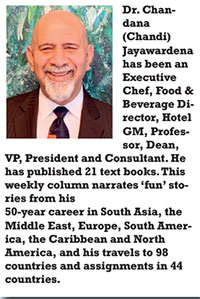 new heights of professionalism, efficiency and innovation.
new heights of professionalism, efficiency and innovation.
Usually, the CHSGA AGM is a three-day event of professional, social and fellowship celebrations. Due to the pandemic, we had to settle for less via Zoom; but the show went on. Considering the humble beginnings of CHSGA in 1971 at the CHS hostel with fewer than 50 members, it is impressive that CHSGA now has over 1,200 professional members and is going from strength to strength.
Like many other hospitality institutions, CHSGA is affected by the pandemic. However, its commitment to professional development of its members through centres for excellence and support to the Sri Lanka Institute of Tourism and Hotel Management (SLITHM) and students continues commendably. CHSHA due to previous fund-raising efforts and projects such as the Hotel Show, continues to be financially sound.
A nostalgic interview
On October 17, 2021, the 3,550-member strong (from over 100-countries) Global Hospitality Forum (GHF) hosted its first-ever online Q&A session. It was organized with the assistance from the International Tourism Volunteers Association (ITVA). I interviewed a CHS graduate of the first batch (1966-1969), who taught me hospitality 50 years ago. As a former student of Mr. Rohan De Silva Jayasundara, it was indeed nostalgic and an honour for me to do this interview. With a view of inspiring the audience, I asked of series of questions about my lecturer’s amazing career in hospitality education in seven countries. Listening to this legend in International Hospitality Education talk about his career in Sri Lanka, West Germany, Brunei, Australia, Cook Islands, Vanuatu, and Marshall Islands was a rare opportunity.
For the benefit of those who missed the webinar, the organizers will post its video clip on Facebook pages of GHF and ITVA. Encouraged with its popularity, it was decided to hold such online Q&A sessions with hospitality legends (with over 50 years’ experience in distinguished careers), every month. On November 14, the Global Hospitality Forum’s Q&A session will be with Mahinda Ratnayake who as General Manager, opened the first ever five-star resort in Sri Lanka in 1982 – Triton Hotel. These sessions are open for anyone interested, free of charge.
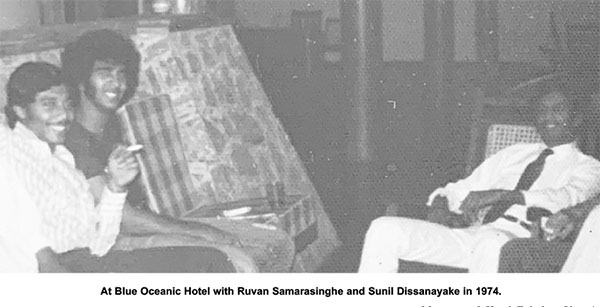
Interviews at Hotel Lanka Oberoi
In 1974 I did well at my first interview for a post of chef de partie at Hotel Lanka Oberoi which was getting ready to open the largest hotel in Sri Lanka. After the interview I was short listed for a kitchen practical test held at Hotel Renuka where the Executive Chef of Lanka Oberoi and his senior brigade stayed during the hotel’s pre-opening stage. The practical test was to prepare a full meal from a surprise menu given to the finalists five minutes before its commencement. I thought I did well but was not chosen. Later, I heard that the successful candidate was Das Perumpaladas, the Executive Chef of Hotel Renuka and a graduate of the CHS, three years my senior. I realized that they valued his executive chef experience in a small three-star hotel gained over three years.
A week later I was called for two more interviews – one of them at Hotel Lanka Oberoi. The other was at the head office of Whittall Boustead Ltd./Ceylon Holiday Resorts, the owners of my favourite, Bentota Beach and its sister hotel, Coral Gardens. At Hotel Lanka Oberoi I was interviewed by Mr. Joe Madawela, the charismatic Personnel Manager, who was in charge of hiring over 600 employees for the hotel opening. He told me that although I did not make it as a chef de partie, I would be a good candidate for a post such as a bar supervisor. He also told me that if I do well there, I may get an opportunity in a couple of years to be further trained at the Oberoi School of Hotel Management in India for two years. That was the key to become a hotel manager within this regional hotel chain. I agreed to think about it and get back within a week if I was interested.
Eleven years later, I met Joe for the second time. In 1985, he was managing the Queens Hotel in Kandy on a secondment from Hotel Lanka Oberoi. I was then the General Manager of the two largest hotels of John Keells Group – The Lodge and The Village, Habarana. I was also the Founding President of Rajarata Hotels Association (North Central Province). The hoteliers in Kandy were thinking of forming a similar association and sought my advice. To advise them and share our best practices from the NCP, I made a couple of trips to Kandy. I enjoyed chatting with Joe during one of those visits. He had a remarkable memory and narrated details of my interview with him 11 years earlier saying he was disappointed that I did not take his offer in 1974 as he thought that I would have done well with Oberoi. Four years later in 1989, I finally accepted an ‘expatriate contract’ offer from the Oberoi Group and became the Food and Beverage Manager of Hotel Babylon Oberoi in Baghdad, Iraq. Of the ten managers who reported to me, half were graduates of the Oberoi School of Hotel Management in India.
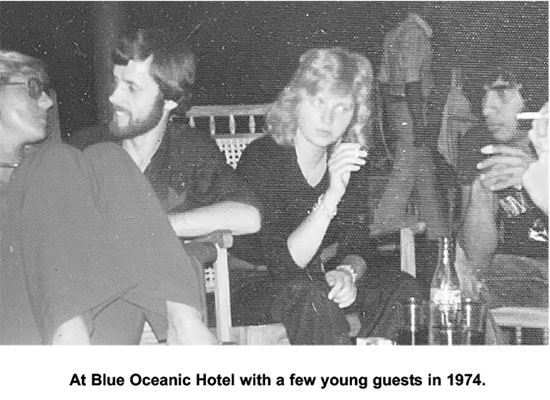
An offer from Bentota Beach Hotel
When I went for the interview at Whittall Boustead, I was immediately offered the post of Trainee Executive Chef (number three in the kitchen) at Bentota Beach Hotel. Mr. Gilbert Paranagama, the Director in charge of their two hotels told me that the management of the hotel was impressed with my work during my recent CHS internship. He made a good offer of a 500-rupee salary and free board and lodging at the executive quarters within the hotel. I was very pleased and accepted the offer. He also briefly introduced me to the Company Chairman, Mr. Sanmugam Cumaraswamy, a well-known Chartered Accountant and businessman.
Leaving Colombo
When I gave notice and handed over my resignation from Havelock Tourinn, the General Manager, Mr. C. Nagendra was very disappointed. He was shocked that someone would leave the position assistant manager of a city hotel to become number three chef in a resort hotel. However, having made my career plan, I was convinced that I was making the right move. Leaving Colombo was not easy. It was my birth place and I lived there for the first 20 years of my life. With my career move, and the desire to live in different parts of Sri Lanka, I knew that I would miss my family, friends, Judo club, many social events and entertainment.
I kept in touch with many of my CHS friends now scattered around the country and students from junior CHS batches who were continuing in Colombo. The friendships that commenced in 1971 at CHS, have now continued for over 50 years. Since 2011, I administered a private Facebook group I founded. It is branded as ‘CHS Lord Veterans’, where nearly 100 CHS colleagues who graduated with the original three-year diploma between 1969 and 1976, are connected around the world. The members of this exclusive group regularly share past, present and future posts. Most are retired now and sadly over a dozen have passed away in recent years. Another recent initiative is a WhatsApp group branded as, ‘Seftonites – 66-76’ exclusively for those CHS colleagues who lived in our good old hostel – Sefton, named after an original expatriate faculty member. This WhatsApp group is very active with several general posts and comments every day. The bonding we made at CHS is very special and the CHS nostalgia lives on…
A Brief Romance in Negombo
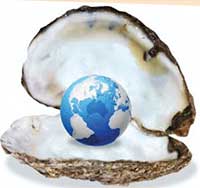 In between my departure from Colombo and settling in Bentota, I had a free long weekend. I planned to spend it at the Katunayake airport bidding farewell to my CHS batch mate, Neil Maurice who was migrating to Australia. Almost all our batch came to this farewell and we made it a ‘one for the road’ booze party at the airport to the displeasure of the airport security guards. Our ‘Dutch courage’ certainly helped us to bravely ignore them.
In between my departure from Colombo and settling in Bentota, I had a free long weekend. I planned to spend it at the Katunayake airport bidding farewell to my CHS batch mate, Neil Maurice who was migrating to Australia. Almost all our batch came to this farewell and we made it a ‘one for the road’ booze party at the airport to the displeasure of the airport security guards. Our ‘Dutch courage’ certainly helped us to bravely ignore them.
After that, I planned to spend two days at Blue Oceanic Hotel in Negombo with two friends. One of my high school mates, Ruvan Samarasinghe (now the Managing Director at Jetwing Hotels) was the Manager of this first hotel built by Mr. Herbert Cooray for his Jetwing Group. One of my batchmates, Sunil Dissanayake (now the CEO of BMICH) was the Front Office Manager. Like all Sri Lankan hoteliers, Ruvan and Dissa were very hospitable. They hosted me generously.
On my first evening at Blue Oceanic, Ruvan invited me for dinner after drinks at the bar. A few young Swedish tourists who were very friendly asked why we were laughing so much and joined our table. A 19-year-old girl, whose nickname was Blondie, asked me, “Chandi, what kind of music is played by the hotel band?” When I told her that it was Calypso from Trinidad and Tobago, she asked me, “Can you dance to this music?” “Yes, I will show you.” I was quick to grab her before my friends got ideas and took her to the dance floor to show her how it’s done. We later went for a long care-free, barefoot beach walk counting fishing boats and the stars on a beautiful moon-lit night.
I met those friendly tourists again the next morning and ended up hanging out with them on the beach the whole day. The next day I had to leave early for Bentota to begin my new job at Bentota Beach Hotel. When I said goodbye, Blondie promised “I will write to you” and did so regularly for the next three years. We became pen pals until she returned to Sri Lanka in 1977 for a three-week holiday in search of her soulmate. Blondie was my first ‘serious’ girlfriend.
Features
Pakistan-Sri Lanka ‘eye diplomacy’
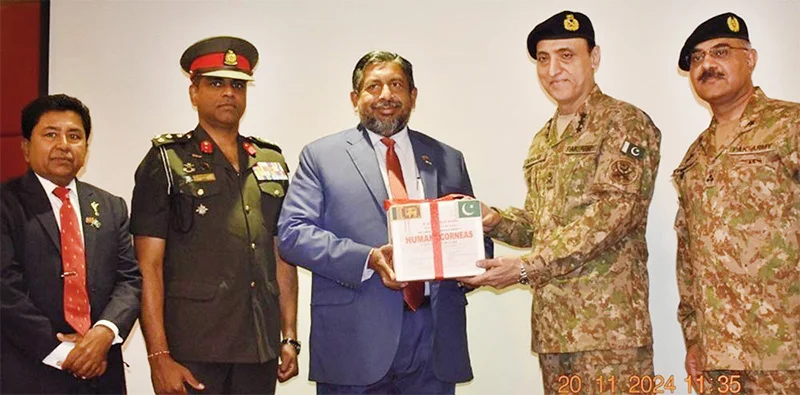
Reminiscences:
I was appointed Managing Director of the Ceylon Petroleum Corporation (CPC) and Chairman of the Trincomalee Petroleum Terminals Ltd (TPTL – Indian Oil Company/ Petroleum Corporation of Sri Lanka joint venture), in February 2023, by President Ranil Wickremesinghe. I served as TPTL Chairman voluntarily. TPTL controls the world-renowned oil tank farm in Trincomalee, abandoned after World War II. Several programmes were launched to repair tanks and buildings there. I enjoyed travelling to Trincomalee, staying at Navy House and monitoring the progress of the projects. Trincomalee is a beautiful place where I spent most of my time during my naval career.
My main task as MD, CPC, was to ensure an uninterrupted supply of petroleum products to the public.
With the great initiative of the then CPC Chairman, young and energetic Uvis Mohammed, and equally capable CPC staff, we were able to do our job diligently, and all problems related to petroleum products were overcome. My team and I were able to ensure that enough stocks were always available for any contingency.
The CPC made huge profits when we imported crude oil and processed it at our only refinery in Sapugaskanda, which could produce more than 50,000 barrels of refined fuel in one stream working day! (One barrel is equal to 210 litres). This huge facility encompassing about 65 acres has more than 1,200 employees and 65 storage tanks.
A huge loss the CPC was incurring due to wrong calculation of “out turn loss” when importing crude oil by ships and pumping it through Single Point Mooring Buoy (SPMB) at sea and transferring it through underwater fuel transfer lines to service tanks was detected and corrected immediately. That helped increase the CPC’s profits.
By August 2023, the CPC made a net profit of 74,000 million rupees (74 billion rupees)! The President was happy, the government was happy, the CPC Management was happy and the hard-working CPC staff were happy. I became a Managing Director of a very happy and successful State-Owned Enterprise (SOE). That was my first experience in working outside military/Foreign service.
I will be failing in my duty if I do not mention Sagala Rathnayake, then Chief of Staff to the President, for recommending me for the post of MD, CPC.
The only grievance they had was that we were not able to pay their 2023 Sinhala/Tamil New Year bonus due to a government circular. After working at CPC for six months and steering it out of trouble, I was ready to move out of CPC.
I was offered a new job as the Sri Lanka High Commissioner to Pakistan. I was delighted and my wife and son were happy. Our association with Pakistan, especially with the Pakistan Military, is very long. My son started schooling in Karachi in 1995, when I was doing the Naval War Course there. My wife Yamuna has many good friends in Pakistan. I am the first Military officer to graduate from the Karachi University in 1996 (BSc Honours in War Studies) and have a long association with the Pakistan Navy and their Special Forces. I was awarded the Nishan-e-Imtiaz (Military) medal—the highest National award by the Pakistan Presidentm in 2019m when I was Chief of Defence Staff. I am the only Sri Lankan to have been awarded this prestigious medal so far. I knew my son and myself would be able to play a quiet game of golf every morning at the picturesque Margalla Golf Club, owned by the Pakistan Navy, at the foot of Margalla hills, at Islamabad. The golf club is just a walking distance from the High Commissioner’s residence.
When I took over as Sri Lanka High Commissioner at Islamabad on 06 December 2023, I realised that a number of former Service Commanders had held that position earlier. The first Ceylonese High Commissioner to Pakistan, with a military background, was the first Army Commander General Anton Muthukumaru. He was concurrently Ambassador to Iran. Then distinguished Service Commanders, like General H W G Wijayakoon, General Gerry Silva, General Srilal Weerasooriya, Air Chief Marshal Jayalath Weerakkody, served as High Commissioners to Islamabad. I took over from Vice Admiral Mohan Wijewickrama (former Chief of Staff of Navy and Governor Eastern Province).
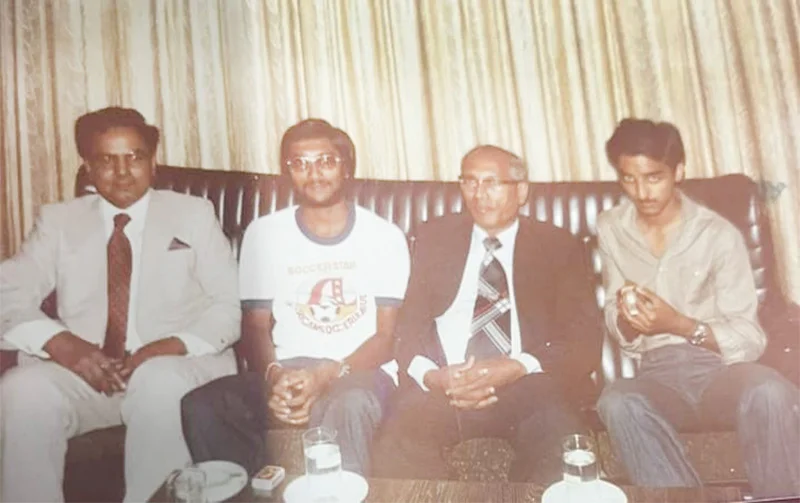
A photograph of Dr. Silva (second from right) in Brigadier
(Dr) Waquar Muzaffar’s album
One of the first visitors I received was Kawaja Hamza, a prominent Defence Correspondent in Islamabad. His request had nothing to do with Defence matters. He wanted to bring his 84-year-old father to see me; his father had his eyesight restored with corneas donated by a Sri Lankan in 1972! His eyesight is still good, but he did not know the Sri Lankan donor who gave him this most precious gift. He wanted to pay gratitude to the new Sri Lankan High Commissioner and to tell him that as a devoted Muslim, he prayed for the unknown donor every day! That reminded me of what my guru in Foreign Service, the late Foreign Minister Lakshman Kadirgamar told me when I was First Secretary/ Defence Advisor, Sri Lanka High Commission in New Delhi. That is “best diplomacy is people-to-people contacts.” This incident prompted me to research more into “Pakistan-Sri Lanka Eye Diplomacy” and what I learnt was fascinating!
Do you know the Sri Lanka Eye Donation Society has donated more than 26,000 corneas to Pakistan, since 1964 to date! That means more than 26,000 Pakistani people see the world with SRI LANKAN EYES! The Sri Lankan Eye Donation Society has provided 100,000 eye corneas to foreign countries FREE! To be exact 101,483 eye corneas during the last 65 years! More than one fourth of these donations was to one single country- Pakistan. Recent donations (in November 2024) were made to the Pakistan Military at Armed Forces Institute of Ophthalmology (AFIO), Rawalpindi, to restore the sight of Pakistan Army personnel who suffered eye injuries due to Improvised Explosive Devices (IED) blasts. This donation was done on the 75th Anniversary of the Sri Lanka Army.
Deshabandu Dr. F. G. Hudson Silva, a distinguished old boy of Nalanda College, Colombo, started collecting eye corneas as a medical student in 1958. His first set of corneas were collected from a deceased person and were stored at his home refrigerator at Wijerama Mawatha, Colombo 7. With his wife Iranganie De Silva (nee Kularatne), he started the Sri Lanka Eye Donation Society in 1961. They persuaded Buddhists to donate their eyes upon death. This drive was hugely successful.
Their son (now in the US) was a contemporary of mine at Royal College. I pledged to donate (of course with my parents’ permission) my eyes upon my death when I was a student at Royal college in 1972 on a Poson Full Moon Poya Day. Thousands have done so.
On Vesak Full Moon Poya Day in 1964, the first eye corneas were carried in a thermos flask filled with Ice, to Singapore, by Dr Hudson Silva and his wife and a successful eye transplant surgery was performed. From that day, our eye corneas were sent to 62 different countries.
Pakistan Lions Clubs, which supported this noble gesture, built a beautiful Eye Hospital for humble people at Gulberg, Lahore, where eye surgeries are performed, and named it Dr Hudson Silva Lions Eye Hospital.
The good work has continued even after the demise of Dr Hudson Silva in 1999.
So many people have donated their eyes upon their death, including President J. R. Jayewardene, whose eye corneas were used to restore the eyesight of one Japanese and one Sri Lankan. Dr Hudson Silva became a great hero in Pakistan and he was treated with dignity and respect whenever he visited Pakistan. My friend, Brigadier (Dr) Waquar Muzaffar, the Commandant of AFIO, was able to dig into his old photographs and send me a precious photo taken in 1980, 46 years ago (when he was a medical student), with Dr Hudson Silva.
We will remember Dr and Mrs Hudson Silva with gratitude.
Bravo Zulu to Sri Lanka Eye Donation Society!
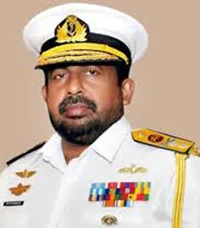 by Admiral Ravindra C Wijegunaratne
by Admiral Ravindra C Wijegunaratne
WV, RWP and Bar, RSP, VSV, USP, NI (M) (Pakistan), ndc, psn, Bsc
(Hons) (War Studies) (Karachi) MPhil (Madras)
Former Navy Commander and Former Chief of Defense Staff
Former Chairman, Trincomalee Petroleum Terminals Ltd
Former Managing Director Ceylon Petroleum Corporation
Former High Commissioner to Pakistan
Features
Lasting solutions require consensus
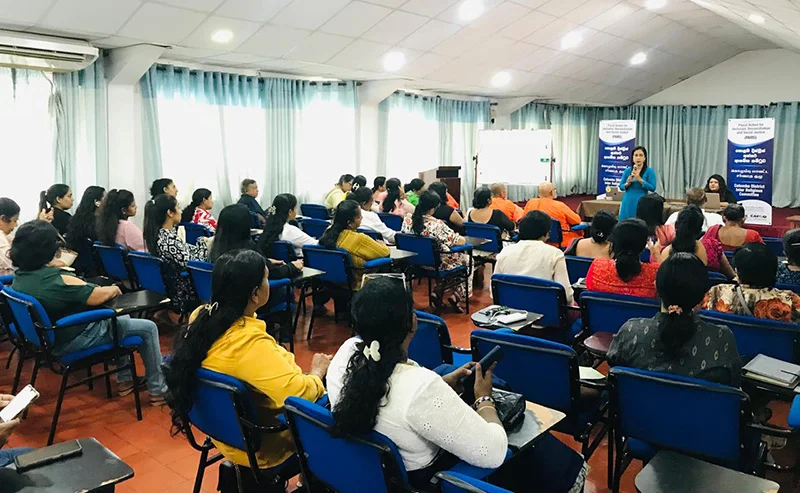
Problems and solutions in plural societies like Sri Lanka’s which have deep rooted ethnic, religious and linguistic cleavages require a consciously inclusive approach. A major challenge for any government in Sri Lanka is to correctly identify the problems faced by different groups with strong identities and find solutions to them. The durability of democratic systems in divided societies depends less on electoral victories than on institutionalised inclusion, consultation, and negotiated compromise. When problems are defined only through the lens of a single political formation, even one that enjoys a large electoral mandate, such as obtained by the NPP government, the policy prescriptions derived from that diagnosis will likely overlook the experiences of communities that may remain outside the ruling party. The result could end up being resistance to those policies, uneven implementation and eventual political backlash.
A recent survey done by the National Peace Council (NPC), in Jaffna, in the North, at a focus group discussion for young people on citizen perception in the electoral process, revealed interesting developments. The results of the NPC micro survey support the findings of the national survey by Verite Research that found that government approval rating stood at 65 percent in early February 2026. A majority of the respondents in Jaffna affirm that they feel safer and more fairly treated than in the past. There is a clear improving trend to be seen in some areas, but not in all. This survey of predominantly young and educated respondents shows 78 percent saying livelihood has improved and an equal percentage feeling safe in daily life. 75 percent express satisfaction with the new government and 64 percent believe the state treats their language and culture fairly. These are not insignificant gains in a region that bore the brunt of three decades of war.
Yet the same survey reveals deep reservations that temper this optimism. Only 25 percent are satisfied with the handling of past issues. An equal percentage see no change in land and military related concerns. Most strikingly, almost 90 percent are worried about land being taken without consent for religious purposes. A significant number are uncertain whether the future will be better. These negative sentiments cannot be brushed aside as marginal. They point to unresolved structural questions relating to land rights, demilitarisation, accountability and the locus of political power. If these issues are not addressed sooner rather than later, the current stability may prove fragile. This suggests the need to build consensus with other parties to ensure long-term stability and legitimacy, and the need for partnership to address national issues.
NPP Absence
National or local level problems solving is unlikely to be successful in the longer term if it only proceeds from the thinking of one group of people even if they are the most enlightened. Problem solving requires the engagement of those from different ethno-religious, caste and political backgrounds to get a diversity of ideas and possible solutions. It does not mean getting corrupted or having to give up the good for the worse. It means testing ideas in the public sphere. Legitimacy flows not merely from winning elections but from the quality of public reasoning that precedes decision-making. The experience of successful post-conflict societies shows that long term peace and development are built through dialogue platforms where civil society organisations, political actors, business communities, and local representatives jointly define problems before negotiating policy responses.
As a civil society organisation, the National Peace Council engages in a variety of public activities that focus on awareness and relationship building across communities. Participants in those activities include community leaders, religious clergy, local level government officials and grassroots political party representatives. However, along with other civil society organisations, NPC has been finding it difficult to get the participation of members of the NPP at those events. The excuse given for the absence of ruling party members is that they are too busy as they are involved in a plenitude of activities. The question is whether the ruling party members have too much on their plate or whether it is due to a reluctance to work with others.
The general belief is that those from the ruling party need to get special permission from the party hierarchy for activities organised by groups not under their control. The reluctance of the ruling party to permit its members to join the activities of other organisations may be the concern that they will get ideas that are different from those held by the party leadership. The concern may be that these different ideas will either corrupt the ruling party members or cause dissent within the ranks of the ruling party. But lasting reform in a plural society requires precisely this exposure. If 90 percent of surveyed youth in Jaffna are worried about land issues, then engaging them, rather than shielding party representatives from uncomfortable conversations, is essential for accurate problem identification.
North Star
The Leader of the Lanka Sama Samaja Party (LSSP), Prof Tissa Vitarana, who passed away last week, gave the example for national level problem solving. As a government minister he took on the challenge the protracted ethnic conflict that led to three decades of war. He set his mind on the solution and engaged with all but never veered from his conviction about what the solution would be. This was the North Star to him, said his son to me at his funeral, the direction to which the Compass (Malimawa) pointed at all times. Prof Vitarana held the view that in a diverse and plural society there was a need to devolve power and share power in a structured way between the majority community and minority communities. His example illustrates that engagement does not require ideological capitulation. It requires clarity of purpose combined with openness to dialogue.
The ethnic and religious peace that prevails today owes much to the efforts of people like Prof Vitarana and other like-minded persons and groups which, for many years, engaged as underdogs with those who were more powerful. The commitment to equality of citizenship, non-racism, non-extremism and non-discrimination, upheld by the present government, comes from this foundation. But the NPC survey suggests that symbolic recognition and improved daily safety are not enough. Respondents prioritise personal safety, truth regarding missing persons, return of land, language use and reduction of military involvement. They are also asking for jobs after graduation, local economic opportunity, protection of property rights, and tangible improvements that allow them to remain in Jaffna rather than migrate.
If solutions are to be lasting they cannot be unilaterally imposed by one party on the others. Lasting solutions cannot be unilateral solutions. They must emerge from a shared diagnosis of the country’s deepest problems and from a willingness to address the negative sentiments that persist beneath the surface of cautious optimism. Only then can progress be secured against reversal and anchored in the consent of the wider polity. Engaging with the opposition can help mitigate the hyper-confrontational and divisive political culture of the past. This means that the ruling party needs to consider not only how to protect its existing members by cloistering them from those who think differently but also expand its vision and membership by convincing others to join them in problem solving at multiple levels. This requires engagement and not avoidance or withdrawal.
by Jehan Perera
Features
Unpacking public responses to educational reforms
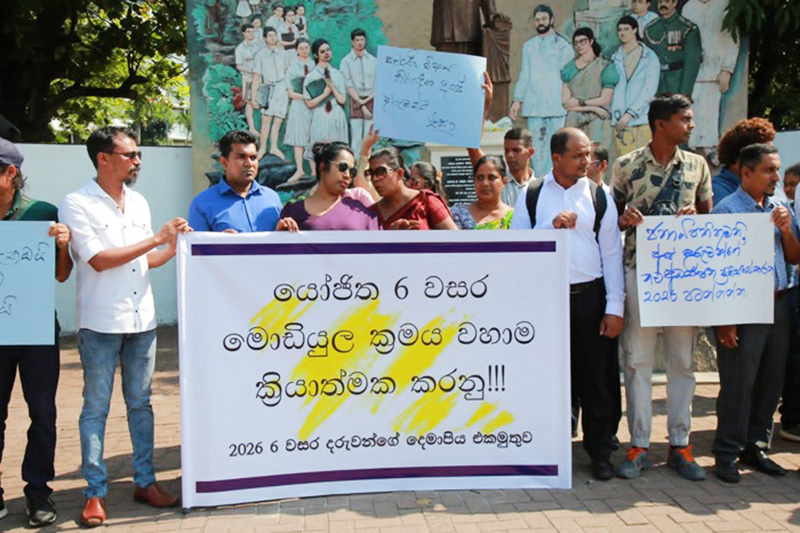
 As the debate on educational reforms rages, I find it useful to pay as much attention to the reactions they have excited as we do to the content of the reforms. Such reactions are a reflection of how education is understood in our society, and this understanding – along with the priorities it gives rise to – must necessarily be taken into account in education policy, including and especially reform. My aim in this piece, however, is to couple this public engagement with critical reflection on the historical-structural realities that structure our possibilities in the global market, and briefly discuss the role of academics in this endeavour.
As the debate on educational reforms rages, I find it useful to pay as much attention to the reactions they have excited as we do to the content of the reforms. Such reactions are a reflection of how education is understood in our society, and this understanding – along with the priorities it gives rise to – must necessarily be taken into account in education policy, including and especially reform. My aim in this piece, however, is to couple this public engagement with critical reflection on the historical-structural realities that structure our possibilities in the global market, and briefly discuss the role of academics in this endeavour.
Two broad reactions
The reactions to the proposed reforms can be broadly categorised into ‘pro’ and ‘anti’. I will discuss the latter first. Most of the backlash against the reforms seems to be directed at the issue of a gay dating site, accidentally being linked to the Grade 6 English module. While the importance of rigour cannot be overstated in such a process, the sheer volume of the energies concentrated on this is also indicative of how hopelessly homophobic our society is, especially its educators, including those in trade unions. These dispositions are a crucial part of the reason why educational reforms are needed in the first place. If only there was a fraction of the interest in ‘keeping up with the rest of the world’ in terms of IT, skills, and so on, in this area as well!
Then there is the opposition mounted by teachers’ trade unions and others about the process of the reforms not being very democratic, which I (and many others in higher education, as evidenced by a recent statement, available at https://island.lk/general-educational-reforms-to-what-purpose-a-statement-by-state-university-teachers/ ) fully agree with. But I earnestly hope the conversation is not usurped by those wanting to promote heteronormativity, further entrenching bigotry only education itself can save us from. With this important qualification, I, too, believe the government should open up the reform process to the public, rather than just ‘informing’ them of it.
It is unclear both as to why the process had to be behind closed doors, as well as why the government seems to be in a hurry to push the reforms through. Considering other recent developments, like the continued extension of emergency rule, tabling of the Protection of the State from Terrorism Act (PSTA), and proposing a new Authority for the protection of the Central Highlands (as is famously known, Authorities directly come under the Executive, and, therefore, further strengthen the Presidency; a reasonable question would be as to why the existing apparatus cannot be strengthened for this purpose), this appears especially suspect.
Further, according to the Secretary to the MOE Nalaka Kaluwewa: “The full framework for the [education] reforms was already in place [when the Dissanayake government took office]” (https://www.wsws.org/en/articles/2025/08/12/wxua-a12.html, citing The Morning, July 29). Given the ideological inclinations of the former Wickremesinghe government and the IMF negotiations taking place at the time, the continuation of education reforms, initiated in such a context with very little modification, leaves little doubt as to their intent: to facilitate the churning out of cheap labour for the global market (with very little cushioning from external shocks and reproducing global inequalities), while raising enough revenue in the process to service debt.
This process privileges STEM subjects, which are “considered to contribute to higher levels of ‘employability’ among their graduates … With their emphasis on transferable skills and demonstrable competency levels, STEM subjects provide tools that are well suited for the abstraction of labour required by capitalism, particularly at the global level where comparability across a wide array of labour markets matters more than ever before” (my own previous piece in this column on 29 October 2024). Humanities and Social Sciences (HSS) subjects are deprioritised as a result. However, the wisdom of an education policy that is solely focused on responding to the global market has been questioned in this column and elsewhere, both because the global market has no reason to prioritise our needs as well as because such an orientation comes at the cost of a strategy for improving the conditions within Sri Lanka, in all sectors. This is why we need a more emancipatory vision for education geared towards building a fairer society domestically where the fruits of prosperity are enjoyed by all.
The second broad reaction to the reforms is to earnestly embrace them. The reasons behind this need to be taken seriously, although it echoes the mantra of the global market. According to one parent participating in a protest against the halting of the reform process: “The world is moving forward with new inventions and technology, but here in Sri Lanka, our children are still burdened with outdated methods. Opposition politicians send their children to international schools or abroad, while ours depend on free education. Stopping these reforms is the lowest act I’ve seen as a mother” (https://www.newsfirst.lk/2026/01/17/pro-educational-reforms-protests-spread-across-sri-lanka). While it is worth mentioning that it is not only the opposition, nor in fact only politicians, who send their children to international schools and abroad, the point holds. Updating the curriculum to reflect the changing needs of a society will invariably strengthen the case for free education. However, as mentioned before, if not combined with a vision for harnessing education’s emancipatory potential for the country, such a move would simply translate into one of integrating Sri Lanka to the world market to produce cheap labour for the colonial and neocolonial masters.
According to another parent in a similar protest: “Our children were excited about lighter schoolbags and a better future. Now they are left in despair” (https://www.newsfirst.lk/2026/01/17/pro-educational-reforms-protests-spread-across-sri-lanka). Again, a valid concern, but one that seems to be completely buying into the rhetoric of the government. As many pieces in this column have already shown, even though the structure of assessments will shift from exam-heavy to more interim forms of assessment (which is very welcome), the number of modules/subjects will actually increase, pushing a greater, not lesser, workload on students.
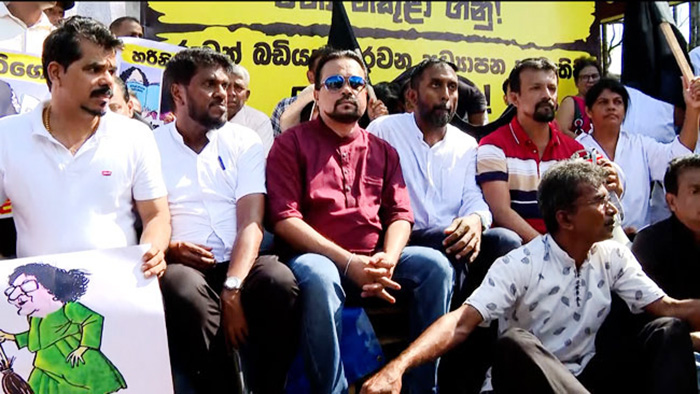
A file photo of a satyagraha against education reforms
What kind of education?
The ‘pro’ reactions outlined above stem from valid concerns, and, therefore, need to be taken seriously. Relatedly, we have to keep in mind that opening the process up to public engagement will not necessarily result in some of the outcomes, those particularly in the HSS academic community, would like to see, such as increasing the HSS component in the syllabus, changing weightages assigned to such subjects, reintroducing them to the basket of mandatory subjects, etc., because of the increasing traction of STEM subjects as a surer way to lock in a good future income.
Academics do have a role to play here, though: 1) actively engage with various groups of people to understand their rationales behind supporting or opposing the reforms; 2) reflect on how such preferences are constituted, and what they in turn contribute towards constituting (including the global and local patterns of accumulation and structures of oppression they perpetuate); 3) bring these reflections back into further conversations, enabling a mutually conditioning exchange; 4) collectively work out a plan for reforming education based on the above, preferably in an arrangement that directly informs policy. A reform process informed by such a dialectical exchange, and a system of education based on the results of these reflections, will have greater substantive value while also responding to the changing times.
Two important prerequisites for this kind of endeavour to succeed are that first, academics participate, irrespective of whether they publicly endorsed this government or not, and second, that the government responds with humility and accountability, without denial and shifting the blame on to individuals. While we cannot help the second, we can start with the first.
Conclusion
For a government that came into power riding the wave of ‘system change’, it is perhaps more important than for any other government that these reforms are done for the right reasons, not to mention following the right methods (of consultation and deliberation). For instance, developing soft skills or incorporating vocational education to the curriculum could be done either in a way that reproduces Sri Lanka’s marginality in the global economic order (which is ‘system preservation’), or lays the groundwork to develop a workforce first and foremost for the country, limited as this approach may be. An inextricable concern is what is denoted by ‘the country’ here: a few affluent groups, a majority ethno-religious category, or everyone living here? How we define ‘the country’ will centrally influence how education policy (among others) will be formulated, just as much as the quality of education influences how we – students, teachers, parents, policymakers, bureaucrats, ‘experts’ – think about such categories. That is precisely why more thought should go to education policymaking than perhaps any other sector.
(Hasini Lecamwasam is attached to the Department of Political Science, University of Peradeniya).
Kuppi is a politics and pedagogy happening on the margins of the lecture hall that parodies, subverts, and simultaneously reaffirms social hierarchies.
-

 Life style4 days ago
Life style4 days agoMarriot new GM Suranga
-

 Business3 days ago
Business3 days agoMinistry of Brands to launch Sri Lanka’s first off-price retail destination
-

 Features4 days ago
Features4 days agoMonks’ march, in America and Sri Lanka
-

 Opinion7 days ago
Opinion7 days agoWill computers ever be intelligent?
-

 Features4 days ago
Features4 days agoThe Rise of Takaichi
-

 Features4 days ago
Features4 days agoWetlands of Sri Lanka:
-

 News4 days ago
News4 days agoThailand to recruit 10,000 Lankans under new labour pact
-

 News4 days ago
News4 days agoMassive Sangha confab to address alleged injustices against monks












